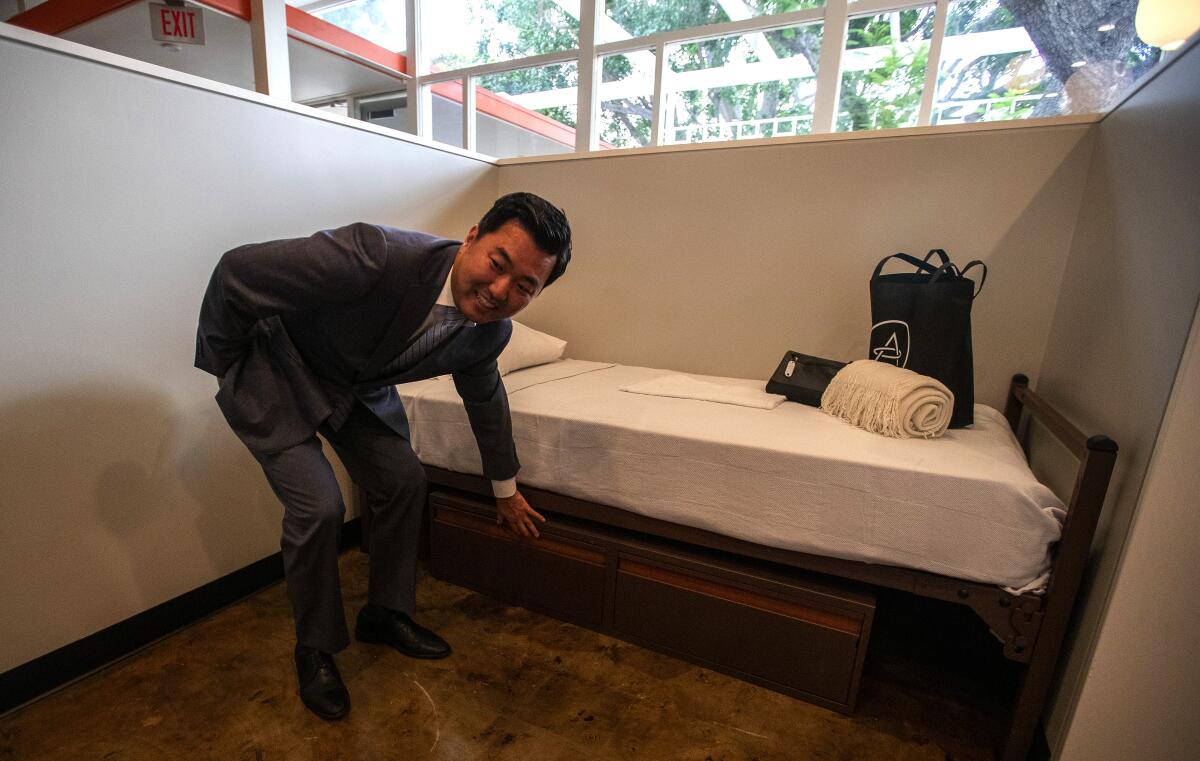Editorial: An intriguing plan to speed up homeless housing in L.A. — let the mayor decide where it goes

- Share via
It’s not easy getting a construction project approved in Los Angeles, but the process of building homeless housing and shelter is an especially harrowing journey through the city bureaucracy, with multiple stops at the City Council, the Department of Water and Power and various other departments. That’s in addition to the time spent courting nervous, if not resistant, residents in the project’s neighborhood. And for permanent housing, there’s the time spent chasing down financing from an assortment of state, city and private lenders. As badly as the city needs housing and shelter for homeless people, the grim reality is that nothing gets built fast in Los Angeles.
Officials recognize the problem and are desperately trying to figure out how to speed things along. City Councilman David Ryu has a dramatic proposal: Declare a local homelessness state of emergency and put some real teeth into the measure, giving the mayor full power to site homeless housing and shelter on city-owned land and to change the land-use rules on any parcel — city-owned or privately held — to allow homeless housing and shelter on it. The mayor would also have the power to set up public restrooms and safe parking lots (for people living in their vehicles) on public property and approve any land-use changes necessary for restrooms or safe parking on private property. The mayor could also suspend any city regulatory provisions that were delaying approval of sites for housing, restrooms or parking.
And it would take away from the 15 City Council members their land-use authority over the siting of homeless housing and any necessary zoning changes for it. As a check on the mayor’s new power, this authority would expire after a year, subject to renewal by the council.
It’s unclear whether council members are so committed to speeding up homeless housing that they would give up some of their prized power over land use. But Ryu’s motion to have the city attorney study how to implement this idea has at least two councilmen publicly on board — Joe Buscaino and Marqueece Harris-Dawson both seconded the motion. The proposal would also create a team of representatives from city departments to expedite the permitting process for housing and shelters.
The change in authority would theoretically remove City Council members as targets for the sort of intense community opposition that has torpedoed or delayed some homeless housing and shelter proposals — often with the council member’s acquiescence. Beyond politics, it would also remove the procedural slog through the city bureaucracy that a request for a change in land-use rules requires. And it would put all accountability for siting and zone changes on Mayor Eric Garcetti and whoever follows him into office in a couple of years. Because as we all know, homelessness will be with us far beyond Garcetti’s tenure.
A spokesperson for Garcetti says he supports any policy, including Ryu’s proposal, that would make the housing and shelter process go faster. And the council’s power over land use has, on balance, been more of an obstacle than a boon to homeless housing projects. But would the mayor, who’s presided over an enormous increase in homelessness even as he’s been a vocal advocate for housing, stand up effectively to the added pressure he would get from residents opposed to projects in their neighborhoods? And would he use the new power responsibly? Power isn’t a substitute for backbone or good judgment. The mayor should tell the council how he would wield this authority and what outcomes he hopes to achieve.
Although Ryu’s idea faces hurdles — not only does it need the council’s endorsement, but it may also require voters to approve an amendment to the city charter — it’s worth exploring how it might be implemented and what the mayor might do with the new authority. But there are other, less radical moves the City Council and the mayor should be considering. For example, the council could easily get rid of the requirement that it approve any city-owned parcel being considered for a homeless housing project before the developer can start the process of getting permits, taking away one time-consuming step.
City officials should be thinking of all kinds of ways to speed up this process. The easier the government makes it for developers to run through the project-approval gantlet, the sooner homeless people will have housing and shelter.
More to Read
A cure for the common opinion
Get thought-provoking perspectives with our weekly newsletter.
You may occasionally receive promotional content from the Los Angeles Times.










